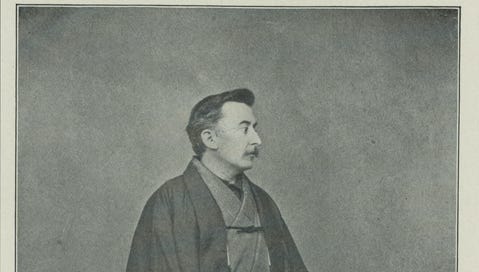Lafcadio Hearn: Part I
Introduction
It is hard to count the number of lives Lafcadio Hearn lived or the myriad challenges he had to overcome. But overcoming them, he certainly did, and to say his life was adventurous would be quite the understatement. Even the barest details of his life come with an aura. Born on a sun-drenched paradise of an island in Greece, raised in Ireland, his early adult years in the American midwest and later young adult years enthralled by New Orleans. Then, falling dearly in love with life in Japan. About which, he wrote,
"What I love in Japan is the Japanese,—the poor simple humanity of the country. It is divine. There is nothing in this world approaching the naive natural charm of them. No book ever written has reflected it. And I love their gods, their customs, their dress, their bird-like quavering songs, their houses, their superstitions, their faults...I only wish I could be reincarnated in some little Japanese baby, so that I could see and feel the world as beautifully as a Japanese brain does."
We get to read about the experiences as an audience, for, along the way, Lafcadio brought many people into his world through such thoughts, along with written tales and articles. Doing so made him one of America's most renowned writers in the 19th century. Maybe even the world's. There with the greats like Twain, Austen, and others.
But unlike these other writers, in the years after passing away, Lafcadio was largely forgotten. That is, except in Japan and New Orleans. Two places that have little to do with one another, yet cherish him as much as he loved them.
Biography
"Knowing that I have nothing resembling genius, and that any ordinary talent must be supplemented with some sort of curious study in order to place it above the mediocre line, I am striving to woo the Muse of the Odd, and hope to succeed in thus attracting some little attention." - Lafcadio Hearn
Lafcadio was born in 1850 on the Ionian island of Lefkada in Greece to Charles Hearn, an Irish surgeon serving in the British Army, and a Greek woman named Rosa Kassimati. Shortly after Lafcadio's birth, his father moved the family to Ireland. And not long after that, when the young boy was just four years old, his mother moved back to Greece.
Away on military service when his wife left, Charles had the marriage annulled upon coming home. Then, perhaps seeking solace in the familiarity of duty or just being used to that as his way of life, he continued to be away. Eventually, he remarried. But father and son would never see each other again.
Keep reading with a 7-day free trial
Subscribe to Historical Snapshots to keep reading this post and get 7 days of free access to the full post archives.




